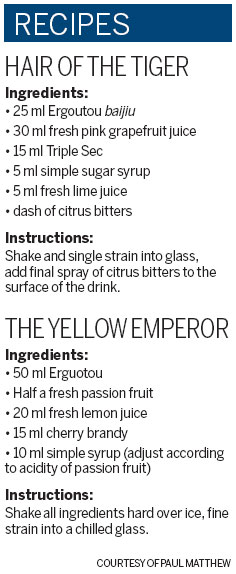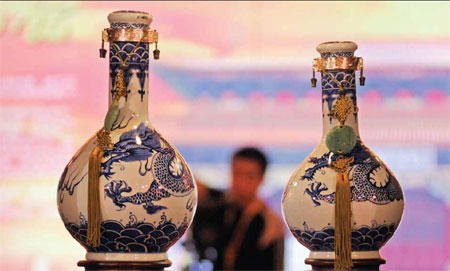The baijiu diaries
Updated: 2012-08-31 10:45
By Marie Cahalane (China Daily)
|
|||||||||||
|
China-based writer and editor Derek Sandhaus says Erguotou is a good, light aroma brand of Chinese baijiu liquor. Su Luzhang / for China Daily |
Chinese spirit is an acquired taste that can also be an integral part of business and pleasure
Literally translated, baijiu(白酒) means "white alcohol" or "white spirit". Weighing in at a highly potent 40-60 percent or above, those who have not spent a while acquiring the taste are certain to cringe after a single sip.
 |
It is no secret that drinking in China can get a little competitive, and with a bottle of baijiu lurking ominously on the table, caution is required.
Traditionally, the drink is an integral part of business dealings.
These business "meetings" may not include much in the way of hard negotiation, but you are being evaluated on your capacity, literally, so keep up!
Baijiu also finds its prestigious place in the arts as a muse. The great Chinese poet Li Bai included baijiu in his verses, such as in his poem, Waking from Drunkenness on a Spring Day (春日醉起言志). It ends as follows:
感知欲叹息 (Moved by its song I soon began to sigh),
对酒还自倾 (and, as wine was there, I filled my own cup).
浩歌待明月 (Wildly singing I waited for the moon to rise),
曲尽已忘情 (when my song was over, all my senses had gone).
Making its appearance at many social occasions, there is no escaping the inevitable baijiu encounter. The pressure to partake is intense, especially for foreigners, so much so that presidential candidate Jon Huntsman, while US ambassador to China, reportedly drank it, despite it being against his Mormon values.
But who actually enjoys it? I certainly do not. It is that last resort drink you have because you must. In Western circles, it is often scorned, and any Chinese person I have asked about baijiu is quick to voice their dislike.
I accept that many beverages are an acquired taste. Coffee, for example, requires five or six samplings and beer up to 10. In the case of baijiu, however, it reputedly takes 300 attempts for your taste buds to appreciate this Chinese nectar.
Yet in 2010 about 1 billion, 9 liter cases of baijiu (that is nine billion liters, roughly 1 1/3 liters for
every person in the world) were produced for consumption, according to the 2011 International Wine & Research Baijiu Report.
Somebody must be drinking it.
Having lived in Beijing for several months, I have indulged in the
spirit, I have resolved never to touch again and, yet, I have found myself repeatedly wincing as baijiu burns its way down my esophagus.
My friend and I partook in several experiments, mixing it with other spirits (in hindsight this was never going to work), treating it like absinthe (a highly flammable experiment) and even endeavoring to create the baijiu cocktail.
Enthusiasm for finding a tolerable means of consumption soon faded, our attempts crippled by its overpowering taste and its potency.
There is hope, however. Let me return to the earlier mention of 300 shots and introduce China-based writer and editor, Derek Sandhaus. His blog 300 Shots at Greatness documents his quest to find the baijiu-filled Holy Grail. This man may be a true hero.
His plan: "Drink 300 shots of baijiu or die trying," while providing recommendations, reviews, historical miscellanea and personal experiences on his epic journey.
The first tip is to snub those tempting 5-yuan bottles that line the shelves of every convenience store as, realistically, alcohol that cheap is never going to be good.
So in the spirit of baijiu (excuse the pun), here is a list of recommendations from Sandhaus:
For a strong aroma baijiu, try Jiannanchun (剑南春),
Erguotou (二锅头) is a good, light aroma brand,
The infamous Moutai Zhen (茅台镇) is a fine example of sauce aroma baijiu,
Guilin Sanhua Jiu (桂林三花酒 ) has a rice aroma,
For a mixed aroma baijiu, opt for Xifengjiu (西凤酒)
If you prefer the elegance of a cocktail glass the following two mixes, created by Beijing-based bartender and cowriter of the blog Blood & Sand Paul Matthew, a master of mixology and, perhaps, the keeper of the secret of the universe. You can be the judge.
So ganbei (干杯, cheers, or literally "dry glass") and remember, drink responsibly and stock up on lucha
(绿茶 green tea), the traditional hangover cure.
Courtesy of The World of Chinese, www.theworldofchinese.com
The World of Chinese
(China Daily 08/31/2012 page25)
Today's Top News
Rescuers race against time for quake victims
Telecom workers restore links
Coal mine blast kills 18 in Jilin
Intl scholarship puts China on the map
More bird flu patients discharged
Gold loses sheen, but still a safe bet
US 'turns blind eye to human rights'
Telecom workers restore links
Hot Topics
Lunar probe , China growth forecasts, Emission rules get tougher, China seen through 'colored lens', International board,
Editor's Picks

|

|

|

|

|

|






